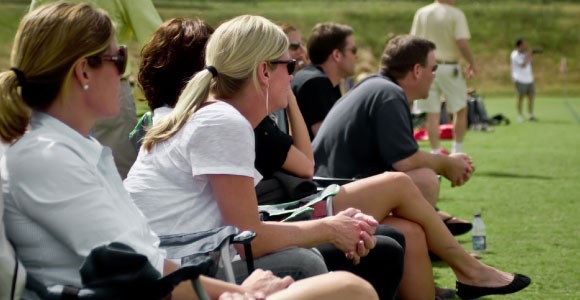In addition to working with young athletes in many sports, I also consult with sport parents to help them to provide to their young athletes the most positive support they can.
Being a great sport parent is no small feat or easy task these days for several reasons. First, we live in a youth-sport culture that is driven by an overemphasis on winning, early specialization, and grandiose dreams of athletic greatness for children.
Second, this culture has spawned what I call the “youth sports industrial complex” (which, I must admit, I am a part of, to some degree) in which the focus is on adults (e.g., parents, coaches, personal trainers) rather than young athletes and making money rather than creating positive and healthy sports experiences for children.
Third, these cultural pressures exert immense pressure on parents to “keep up with the Joneses,” forcing well-intentioned parents to act in ways that are not consistent with their values or in the best interest of their children.
 Finally, parents are human beings with the usual set of baggage from their own upbringings that includes low self-esteem, insecurity, perfectionism, fear of failure, and need to be accepted. These forces can draw well-meaning parents to the “dark side” of sport parenting in which their own needs take precedence over those of their children and they become unhealthy and sometimes truly harmful influences on their children’s athletic and personal development.
Finally, parents are human beings with the usual set of baggage from their own upbringings that includes low self-esteem, insecurity, perfectionism, fear of failure, and need to be accepted. These forces can draw well-meaning parents to the “dark side” of sport parenting in which their own needs take precedence over those of their children and they become unhealthy and sometimes truly harmful influences on their children’s athletic and personal development.
Despite this rather depressing assessment of the current state of youth sport and parental involvement, I still believe that youth sports can have an incredibly positive impact on children in so many aspects of their development including physical, psychological, emotional, and social. Moreover, parents have the power to realize this life-affirming influence of sports on their children if only they will embrace and use that power in the best way possible.
This process of maximizing your children’s sports experience and ensuring that you are the best sport parent you can be begins with your understanding what kind of sport parent you are. To that end, I have developed the Sport Parent Assessment (SPA) that serves several purposes. First, you will learn the key areas that most impact your sport parenting thinking, emotions, and behavior and that either positively or negatively influence your children. Second, you will learn where you stand on these critical sport parenting areas. Third, and most importantly, you can then use this new-found knowledge and insight to guide your sport parenting in a more positive direction.
Sport Parent Assessment
To complete the Sport Parent Assessment, simply rate yourself on a 1-10 scale using the item descriptions and rating definitions provided below. To get the most useful results, you must be willing to look in the mirror, be honest with yourself, and be open to seeing the good, the bad, and the ugly that we as parents all have. I also encourage you to have your spouse or significant other complete the SPA about you to reality test the accuracy of your perceptions. Upon completion, I’ll provide a scoring system below with which you can give yourself an overall rating and also the means to use the information to become the best sport dad or mom you can be.
Note: I developed the SPA as an educational tool to assist sport parents in gaining a better understanding of themselves, the roles they play, and the messages they send in their children’s athletic lives. It has not been empirically tested or scientifically validated, so it may not entirely accurately reflect your involvement in their sports participation.
- Baggage: How much emotional “stuff” (e.g., low self-esteem, insecurity, need for control, need for recognition, need to please, perfectionism, fear of failure) you carry from your upbringing and that impacts your parenting: 1-none; 10-a lot):
- Personal investment: To what degree your ego, identity, and sense of self are wrapped up in your kids’ sports participation (1-none; 10-total):
- Ownership: How much you take responsibility for your kids’ sports participation (1-none, my kids own their sport; 10-total, I own my kids’ sport):
- Process vs. outcome focus: How focused you are on your kids’ sports experiences compared to their results (1-total process focus, what they can do to enjoy themselves and perform their best; 10-total outcome focus, all about their results):
- Expectations: How much you place expectations on your kids before competitions (1-never; 10-always):
- Your nerves before your kids’ competitions: How nervous and stressed you get (1-not at all; 10: very):
- Your emotional reactions following a poor performance: How disappointed, frustrated, and/or angry you feel (1-not at all; 10-more than my kids do):
- Your emotional reactions following a successful performance: How excited you feel (1-not at all; 10-more than my kids do):
- Your kids’ pre-competitive nerves: How nervous and stressed they get before their competitions (1-not at all; 10: very):
- Your kids’ emotional reactions following a poor performance: How upset they feel (1-not at all, shrug it off quickly; 10-very, in tears, upset lasts a long time):
- Your kids’ emotional reactions following a successful performance: Are they excited or relieved (1-more excited; 10-more relieved):
- Messages (How positive or negative the messages you send to your children about their sports participation (1-very positive; 10-very negative):
Overall Scoring and Interpretation
Note: If your score on the SPA is less positive than you had hoped, do not take it as an indictment on your sport parenting. Instead, take it as a call to action to leverage your influence over your children and take active steps to make changes to better support your children’s athletic lives and overall personal development.
Add up your scores for the individual items: _____
Score 80 or higher: A score in this high range on the SPA should be a wake-up call to you! You may be interfering with your children’s athletic experiences, enjoyment, and performances. The messages you are sending through your words, emotions, and actions may hurt your children’s athletic and personal development, and could harm your relationship with them in the short term and into the future. You should reevaluate and make significant changes to your relationship with your children’s athletic lives and the role that their sports play in your life.
Score 40-79: A score in this middle range indicates that you are sending a mixture of healthy and unhealthy messages to your children. These inconsistent messages may be confusing to them and may cause them to develop similarly confusing and counterproductive attitudes, beliefs, emotions, and behaviors toward their own sports participation, which may lower the quality of their athletic experiences, enjoyment, and performances. By looking at your individual-item scores, you can identify those areas in which you need to improve and make relevant changes that will swing your involvement in your children’s athletic lives in a predominantly positive direction.
Score 12-39: A score in this lower range indicates that you are a positive presence in your children’s athletic lives. You are supporting them in ways that focus on their developing healthy values, attitudes, beliefs, and habits related to their sports participation. Your children likely get these messages which allow them to gain the immediate benefits of fun, physical activity, and camaraderie as well as the long-term benefits of life lessons and life skills that sports can teach children. My only suggestion is that you continue to send your positive messages loudly, clearly, and persistently to further protect them the toxic elements of our youth sports culture.
Individual Item Analysis
Though your overall SPA score may not be high, there may be individual areas that deserve your attention and efforts at positive change. Return to the 12 items in the SPA and place a √ next to the items in which you scored a seven (7) or higher. Then, strategize about how you can improve that score to better support your children and provide them with an even more positive sports experience.
Want to learn more about how to be the best sport parent you can be? Read my latest parenting book, Raising Young Athletes: Parenting Your Children to Victory in Sports and Life or enroll in my Prime Sport Parenting 505: Raise Successful and Happy Athletes online course.






